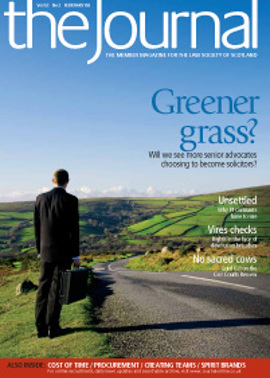Money laundering - the FAQs

By the time you read this, the Third Money-laundering Directive, courtesy of the Money Laundering Regulations 2007, will have been in force for over two months. From inquiries on the professional practice helpline it is clear that although the profession are fairly well aware of their obligations under the regulations, a number of issues are arising consistently.
Practitioners should appreciate that the Society is not responsible for the terms of the regulations, and indeed made representations as to the obligations in them. My primary task on a day-to-day basis in relation to money laundering is to keep the profession safe from prosecution. Once the new regime has been in place a few more months I have no doubt that we will all have a greater grip on exactly how day-to-day business should be dealt with. In the meantime I have assembled six very common FAQs which I hope will be of interest.
1. Can I submit a formal offer without having first carried out due diligence?
Regulation 9 deals with this. SOCA have confirmed to the Society that they view conveyancing as “high risk”. Accordingly no business relationship should be established nor any work carried out on behalf of a client in conveyancing matters (and indeed many other matters) without completing due diligence. While the Society accepts that this may cause difficulties for both the profession and their clients, it is important that solicitors avoid committing an offence under the regulations. Solutions might include (a) ensuring that introducers, correspondents and prospective clients are aware of the regulation and the requirement to establish the business relationship early; (b) seeking certificates from third parties as to identity in terms of reg 17 (particularly suitable when parties are migrating from other jurisdictions); (c) using electronic “client not present” identification systems.
Solicitors should bear in mind that a common money-laundering tactic is to create tight deadlines to put pressure on the solicitor to compromise their systems.
2. Can I continue to rely on pre-1994 identity following the changes?
The regulations make clear that part of your risk assessment requires you to update identity as frequently as the overall risk justifies. This might mean that a client ID only a year old requires to be updated because of the nature of the new transaction. In any event the Society take the view that identity should be refreshed in all cases where it is over five years old at point of new instruction. Accordingly you may no longer rely on pre-1994 identity.
3. Can I accept certificates as to identity from other people, and should I give such certificates myself?
Regulation 17 significantly increases the circumstances in which you can rely on third-party certificates, which under the old regulations were only good for one-off transactions. Care should be taken in both granting and receiving certificates because there is a responsibility beyond the envisaged current transaction. When receiving certificates their authenticity should be independently checked (perhaps with a phone call direct to the granter using a phone number obtained from the professional body website rather than the letterhead provided).
4. I have been told there is a six-month honeymoon period during which enforcement will not take place. Is that correct?
The Society have heard this on a number of occasions and have checked it with SOCA. There is no honeymoon period and SOCA expect those who are subject to the regulations to comply fully with effect from 15 December 2007.
5. Can I tell the solicitor on the other side that I have submitted a report to SOCA?
Essentially the answer is, yes you can in certain circumstances. This issue is covered by the Terrorism Act 2000 and Proceeds of Crime Act 2002 (Amendment) Regulations 2007, which amend s 333C of the Proceeds of Crime Act 2002, effective 26 December 2007 (see panel).
6. There appear to be significant staff training obligations. Is the Society producing any material to assist with this?
The Society ran a series of seminars around the country in early December and the DVD of these is available from Update for a modest charge of £30 plus VAT. The Society is developing a CPD online module in respect of the new regulations which is currently at final review and should be available shortly.
James Ness, Deputy Director, Professional Practice
In this issue
- Members will decide
- Take a firm approach
- Pastures new
- A breach of protocol
- Creating real burdens in developments
- Man with a mission
- A timeless Act
- Cost in a competitive market
- Picking up the pieces
- Summary justice on trial
- Money laundering - the FAQs
- Performance guide
- Getting on the case
- "She stole our data in her underwear!"
- Trust and competence
- So wrong, so long?
- It's oh so quiet...
- Extending adoption rights
- Spirit of the law
- Scottish Solicitors' Discipline Tribunal
- Website reviews
- Book reviews
- Procuring procurement perfection - perhaps
- Repairing the standard






